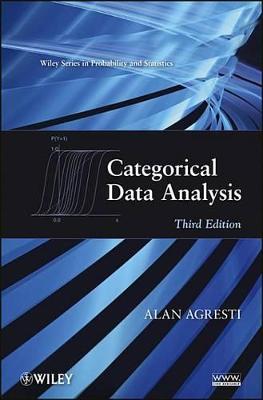Probability & Mathematical Statistics S.
2 total works
Categorical Data Analysis describes the most important methods, offering a unified presentation of modeling using generalized linear models and emphasizing loglinear and logit modeling techniques. Contributions of noted statisticians (Pearson, Yule, Fisher, Neyman, Cochran), whose pioneering efforts set the pace for the evolution of modern methods, are examined as well.
Special features of the book include: Coverage of methods for repeated measurement data, which have become increasingly important in biomedical applications Prescriptions for how ordinal variables should be treated differently than nominal variables Derivations of basic asymptotic and fixed-sample-size inferential methods Discussion of exact small sample procedures More than 40 examples of analyses of "real" data sets, including: aspirin use and heart disease; job satisfaction and income; seat belt use and injuries in auto accidents; and predicting outcomes of baseball games More than 400 exercises to facilitate interpretation and application of methods Categorical Data Analysis also contains an appendix that describes the use of computer software currently available for performing the analyses presented in the book. A comprehensive bibliography and notes and the end of each chapter round out the work, making it a complete, invaluable reference for statisticians, biostatisticians and professional researchers.
Special features of the book include: Coverage of methods for repeated measurement data, which have become increasingly important in biomedical applications Prescriptions for how ordinal variables should be treated differently than nominal variables Derivations of basic asymptotic and fixed-sample-size inferential methods Discussion of exact small sample procedures More than 40 examples of analyses of "real" data sets, including: aspirin use and heart disease; job satisfaction and income; seat belt use and injuries in auto accidents; and predicting outcomes of baseball games More than 400 exercises to facilitate interpretation and application of methods Categorical Data Analysis also contains an appendix that describes the use of computer software currently available for performing the analyses presented in the book. A comprehensive bibliography and notes and the end of each chapter round out the work, making it a complete, invaluable reference for statisticians, biostatisticians and professional researchers.
Statistical science's first coordinated manual of methods for analyzing ordered categorical data presents applications and case studies in fields as diverse as sociology, public health, ecology, marketing, and pharmacy. Analysis of Ordinal Categorical Data provides an introduction to basic descriptive and inferential methods for categorical data and gives thorough coverage of late developments. Special emphasis is placed on interpretation and application of methods including an integrated comparison of the available strategies for analyzing ordinal data. The book also discusses implementation of methods using computer packages such as SAS, SPSSx, and GLIM.

